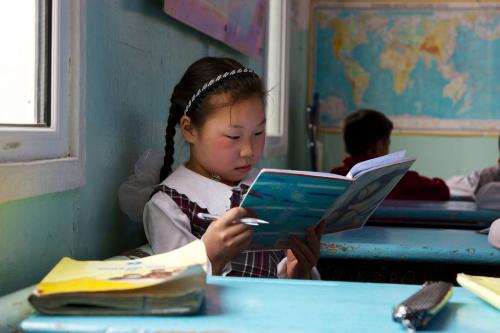On eve of Literacy Day, UN Secretary-General highlights literacy's role in 2030 Agenda
On the eve of International Literacy Day, United Nations Secretary-General Ban Ki-moon called on governments and their partners, including in the private sector, to join forces for universal literacy and build peaceful, just, inclusive and sustainable societies – a vision set out in the new global development agenda.

A young girl studies during class break. With rapid growth, the Government of Mongolia introduced a number of programs to improve the country’s education system, especially rural primary education.
Noting that this is the first year of implementation of the 2030 Agenda, UNESCO stated on its website that, in this context, the vision of literacy is aligned with lifelong learning opportunities with special focus on youth and adults – literacy is a part of Goal 4 of the Sustainable Development Goals that make up the 2030 Agenda. Goal 4 aims to 'ensure inclusive and equitable quality education and promote lifelong learning opportunities for all,' and its target is that by 2030 all youth and a substantial proportion of adults, both men and women, achieve literacy and numeracy.
“The world has changed since 1966 – but our determination to provide every woman and man with the skills, capacities and opportunities to become everything they wish, in dignity and respect, remains as firm as ever. Literacy is a foundation to build a more sustainable future for all,” UNESCO's Director-General Irina Bokova said in her message for the Day.
In his message, Mr. Ban flagged that on Sep 7, with the world becoming increasingly digitized and information rich, new opportunities and challenges are emerging, with more than 750 million adults illiterate, two-thirds of whom are female and including 115 million young people. Some 250 million children of primary school age lack basic literacy skills and 124 million children and adolescents receive no schooling at all.
Such obstacles to sustainable development can and must be overcome by developing and implementing the right policies, backed up by commitment and resources, the UN chief said.
“We need to ensure that those out of school get access to quality learning opportunities, we need to improve the quality of schooling, and we need to promote adult education and learning,” he added.
UNESCO chief: illiterate miss out on benefits
UNESCO's Ms. Bokova also highlighted how those who are illiterate receive none of the benefits of globalization and suffer all its costs.
“These women and men are more vulnerable to ill heath, exploitation and human rights abuse. They are more likely to be unemployed and paid less. Unable to read or write, they are held back from their full potential, and whole communities are locked into vicious cycles of poverty that lay the conditions for violence and strife,” she said.
“Illiteracy remains synonymous with exclusion and poverty – we must turn this around,” she added.
The main global celebration of the day will take place at UNESCO Headquarters in the French capital of Paris in the form of a two-day conference starting on Sep 07, the highlight of which will be the awarding of literacy prizes. At the same time, UNESCO will launch the Global Alliance for Literacy, a new initiative to make all major stakeholders pull together to promote literacy as a foundation for lifelong learning.
Source: United Nations
- 366 reads
Human Rights
Ringing FOWPAL’s Peace Bell for the World:Nobel Peace Prize Laureates’ Visions and Actions

Protecting the World’s Cultural Diversity for a Sustainable Future

The Peace Bell Resonates at the 27th Eurasian Economic Summit

Declaration of World Day of the Power of Hope Endorsed by People in 158 Nations

Puppet Show I International Friendship Day 2020

